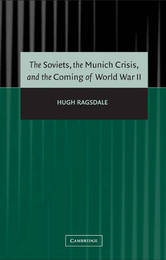
|
The Soviets, the Munich Crisis, and the Coming of World War II
Paperback / softback
Main Details
| Title |
The Soviets, the Munich Crisis, and the Coming of World War II
|
| Authors and Contributors |
By (author) Hugh Ragsdale
|
| Physical Properties |
| Format:Paperback / softback | | Pages:240 | | Dimensions(mm): Height 229,Width 152 |
|
| Category/Genre | World history
Second world war |
|---|
| ISBN/Barcode |
9780521099189
|
| Classifications | Dewey:940.531 |
|---|
| Audience | | Professional & Vocational | |
|---|
| Illustrations |
3 Maps
|
|
Publishing Details |
| Publisher |
Cambridge University Press
|
| Imprint |
Cambridge University Press
|
| Publication Date |
8 January 2009 |
| Publication Country |
United Kingdom
|
Description
The Munich crisis is everywhere acknowledged as the prelude to World War II. If Hitler had been stopped at Munich then World War II as we know it could not have happened. The subject has been thoroughly studied in British, French and German documents and consequently we know that the weakness in the Western position at Munich consisted in the Anglo-French opinion that the Soviet commitment to its allies - France and Czechoslovakia - was utterly unreliable. What has never been seriously studied in the Western literature is the whole spectrum of East European documentation. This book targets precisely this dimension of the problem. The Romanians were at one time prepared to admit the transfer of the Red Army across their territory. The Red Army, mobilised on a massive scale, was informed that its destination was Czechoslovakia. The Polish consul in Lodavia reported the entrance of the Red Army into the country. In the meantime, Moscow focused especially on the Polish rail network. All of these findings are new, and they contribute to a considerable shift in the conventional wisdom on the subject.
Reviews"...indispensable reading." American Historical Review "This is a thoroughly researched, persuasively argued work that materially advances our knowledge of the origins of World War II. It contributes not only to the study of Soviet foreign policy but to the understanding of Romanian diplomacy as well. Furthermore, it develops these central themes in the context of German, British, French, Romanian, Czech, Polish, and Hungarian policy. This is the way international history should be written." Teddy J. Uldricks, Slavic Review "Hugh Ragsdale's work has the advantage of expanding research to include the Eastern European scenario, thanks in particular to documentation from Romania." Journal of Modern History Silvio Pons, Universita degli studi di Roma, Tor Vergata
|